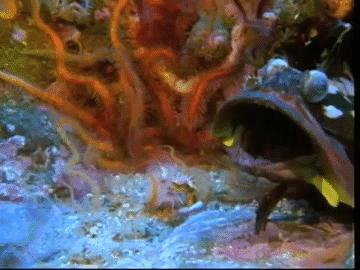Results 2,276 to 2,300 of 3085
Thread: The Fish Thread
-
13-01-2014, 09:11 AM #2276
-
14-01-2014, 10:48 AM #2277
Some fish you just can't throw back

Fish with deadly levels of radioactive cesium have been caught just off the coast of Fukushima prefecture, as scientists continue to assess the damage caused to the marine food chain by the 2011 nuclear disaster.
One of the samples of the 37 black sea bream specimens caught some 37 kilometers south of the crippled power plant tested at 12,400 becquerels per kilogram of radioactive cesium, making it 124 times deadlier than the threshold considered safe for human consumption, Japan's Fisheries Research Agency announced.
The samples were caught at the mouth of the Niidagawa river in Iwaki, Fukushima Prefecture, on November 17. Two other fish caught there also tested non-safe for human consumption, showing radiations levels of 426 and 197 becquerels per kilogram. The rest of the fish were reportedly within safety limits.
Black sea bream are currently restricted from being fished in Miyagi and Fukushima prefectures and sold for human consumption, as scientists from the Fisheries Research Agency say they plan to investigate the source of the contamination further.
After the Fukushima disaster, Japan lowered its threshold for cesium levels in food from 500 becquerels per kg to 100 becquerels per kilo, making the country’s regulations six times stricter than European Union standards. The record cesium reading was recorded last year when a fish caught near the plant carried 740,000 becquerels of cesium per kilogram.

Professor Chris Busby from the Scientific Secretary of the European Committee on Radiation Risk and a member of the UK Department of Health Committee Examining Radiation Risk for Internal Emitters (CERRIE), says that despite a high level of radiation in the marine food chain, Japan so far is the only one dealing with a direct threat.
“The concentrations of radionuclides, which are going to the Pacific or have been injected to the Pacific, by the time they get to the US, and to China and to South East Korea and so on will not be enormously high,” Busby told Voice of Russia.
Yet the scientist warned that nuclear contamination of Japan could result in 400-800 extra cancer cases in Japan in the next fifty years.
“We've already seen some effects in infant mortality and thyroid cancer in Japan,” Busby said. “So I think this is just going to get worse. I think we are going to see a major effect on the general health of the Japanese population in Northern Japan. There's going to be a decrease in the birth rate and an increase in the death rate.”
In the meantime, TEPCO, the operator of the Fukushima nuclear site, reported radiation levels 8 times government safety guidelines. TEPCO told press that the predominant reason behind the sharp increase in radiation at the plant was X-rays coming from storage tanks holding radioactive water that has been leaking from the Fukushima facility.I see fish. They are everywhere. They don't know they are fish.
-
17-01-2014, 08:00 AM #2278
-
17-01-2014, 08:14 AM #2279
-
17-01-2014, 08:31 AM #2280
-
17-01-2014, 11:18 AM #2281
^
What a great idea. You could invite friends around for a spot of fishing in the evening. Sure would beat anything on TV.
-
17-01-2014, 11:21 AM #2282
i cleaned the dirty fish tank a fortnight back....it's now pristine clear
i used tap water first time .... refilled with bottled water
i presume that made a difference
no floaters but a couple of guppies have lost their tails
-
17-01-2014, 03:09 PM #2283One of the other fish is nibbling on the guppy tails.
 Originally Posted by ChiangMai noon
Originally Posted by ChiangMai noon
If you've tiger barbs, they are the worst for biting other fish in the tank.
-
17-01-2014, 03:23 PM #2284
-
19-01-2014, 05:45 PM #2285
Fisheye....


-
19-01-2014, 05:48 PM #2286
-
19-01-2014, 07:14 PM #2287
From Monty Python's Meaning Of Life movie

-
19-01-2014, 07:45 PM #2288
-
20-01-2014, 12:28 PM #2289
-
21-01-2014, 01:13 AM #2290Banned






- Join Date
- Apr 2013
- Last Online
- 30-04-2016 @ 12:12 AM
- Location
- The great white north
- Posts
- 1,153
Wow, awesome pics...
That psychedelic pic rocks, misskit!


-
21-01-2014, 03:49 AM #2291Thailand Expat


- Join Date
- Jan 2006
- Last Online
- @
- Posts
- 59,983
Fish face.

-
21-01-2014, 08:44 AM #2292
-
22-01-2014, 06:47 AM #2293
-
22-01-2014, 07:00 AM #2294
-
22-01-2014, 07:02 AM #2295
-
22-01-2014, 08:21 AM #2296
Transparent fish caught in New Zealand

-
22-01-2014, 08:26 AM #2297
-
22-01-2014, 04:06 PM #2298
Specially for Thorny

Gillian Anderson drapes a conger eel around her neck

French-Portuguese actor Barbara Cabrita with a herring
more here:
Latest news, world news, sport and comment from the Guardian | theguardian.com | The Guardian
-
22-01-2014, 04:17 PM #2299

I just googled "The greatest fish picture of all time" ... and who can argue with the result?
-
22-01-2014, 04:27 PM #2300
Thread Information
Users Browsing this Thread
There are currently 2 users browsing this thread. (0 members and 2 guests)









 Reply With Quote
Reply With Quote









